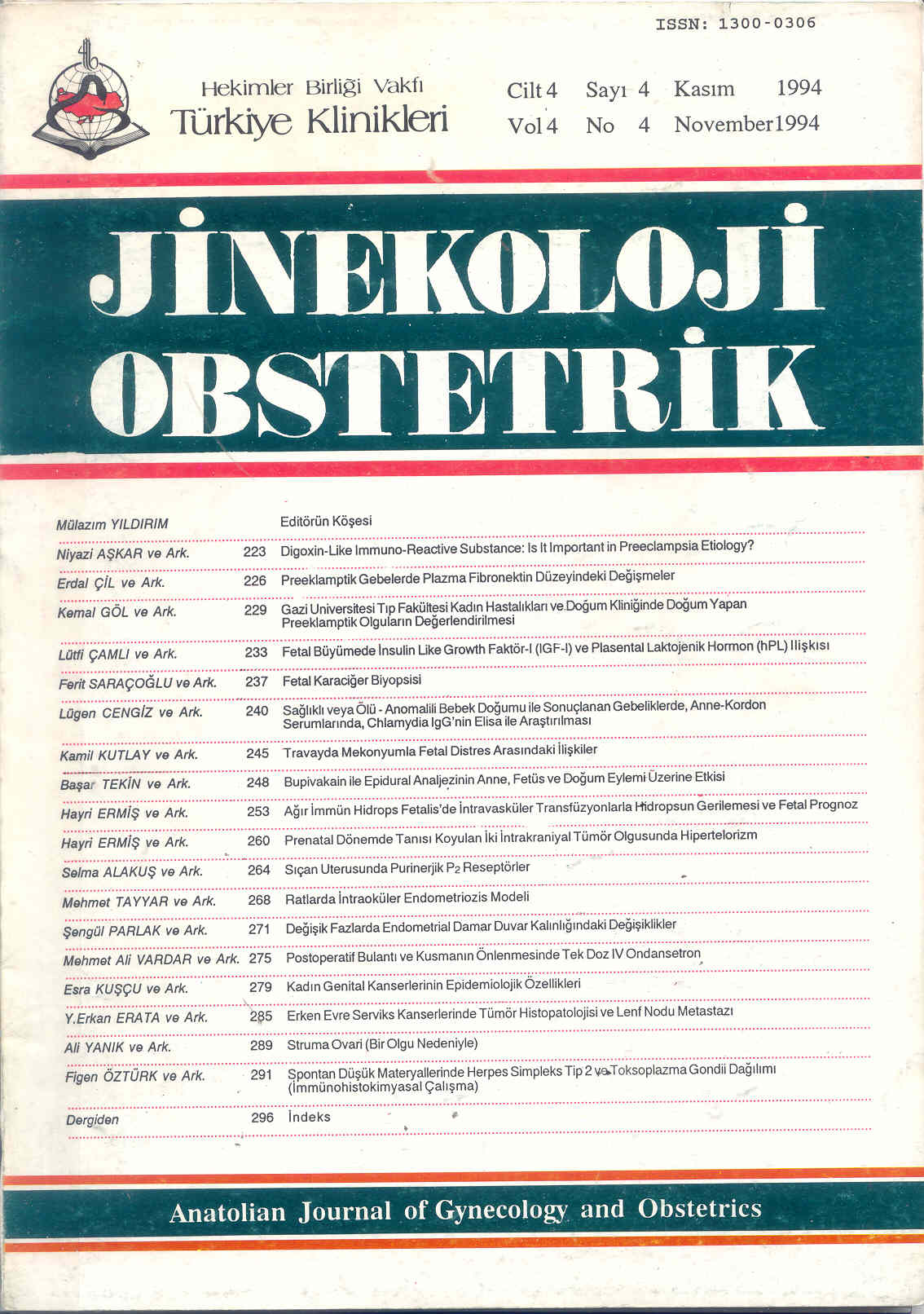Open Access
Peer Reviewed
ARTICLES
2938 Viewed1145 Downloaded
Purinergic P2 Receptors In The Rat Uterus
Sıçan Uterusunda Purinerjik P2 Reseptörler
Turkiye Klinikleri J Gynecol Obst. 1994;4(4):264-7
Article Language: TR
Copyright Ⓒ 2025 by Türkiye Klinikleri. This is an open access article under the CC BY-NC-ND license (http://creativecommons.org/licenses/by-nc-nd/4.0/)
ÖZET
Amaç: İzole sıçan uterusunda purinerjik P2x reseptörü ve purinerjik uyarı hakkında fikir edinmektir. Çalışmanın Yapıldığı Yer: Ondokuz Mayıs Üniversitesi Tıp Fakültesi Farmakoloji AD, Samsun. Materyel ve Metod: Deneylerde 20 dişi sıçanın her iki kornusu kullanıldı. İzole organ banyosunda tesbit edilen her iki preparata agonist olarak ATP (1-100 µM) verilerek doz-cevap eğrisi elde edildi. Antagonist suramin (1-100 µM), ATP'den 5 dakika önce verildi. Ayrıca preparatlar paralel platin elektrotlarla (30 volt; 1m sec; 4-8 hz de 10 s) devanlı elektriksel uyarılara maruz bırakılıp bu duruma suraminin etkisi incelendi. Diğer taraftan izole sıçan uterusunda asetilkolin (1 µM)'in kasıcı ve adrenalin (10 µM) mevcudiyetinde incelendi. Bulgular: ATP'nin izole sıçan uterusunda meydana getirdiği, kontraksiyon, purinerjik P2x reseptör antagonisti suramin tarafından inhibe edildi. Suramin, sıçan uterusunun elektriki uyarılara cevabını azalttı. Diğer taraftan suramin, sıçan uterusunda asetilkolinin kasıcı ve noradrenalinin gevşetici etkisini değiştirmedi. Sonuç: İzole sıçan uterusunda P2x reseptör antagonisti suraminin 10 µM ve üzeri konsantrasyonlarda ATP'nin kasıcı etkisini non kompetetif olarak antagonize etmesi bu organda purinerjik P2x reseptörlerinin var olabileceğini düşündürmektedir.
Amaç: İzole sıçan uterusunda purinerjik P2x reseptörü ve purinerjik uyarı hakkında fikir edinmektir. Çalışmanın Yapıldığı Yer: Ondokuz Mayıs Üniversitesi Tıp Fakültesi Farmakoloji AD, Samsun. Materyel ve Metod: Deneylerde 20 dişi sıçanın her iki kornusu kullanıldı. İzole organ banyosunda tesbit edilen her iki preparata agonist olarak ATP (1-100 µM) verilerek doz-cevap eğrisi elde edildi. Antagonist suramin (1-100 µM), ATP'den 5 dakika önce verildi. Ayrıca preparatlar paralel platin elektrotlarla (30 volt; 1m sec; 4-8 hz de 10 s) devanlı elektriksel uyarılara maruz bırakılıp bu duruma suraminin etkisi incelendi. Diğer taraftan izole sıçan uterusunda asetilkolin (1 µM)'in kasıcı ve adrenalin (10 µM) mevcudiyetinde incelendi. Bulgular: ATP'nin izole sıçan uterusunda meydana getirdiği, kontraksiyon, purinerjik P2x reseptör antagonisti suramin tarafından inhibe edildi. Suramin, sıçan uterusunun elektriki uyarılara cevabını azalttı. Diğer taraftan suramin, sıçan uterusunda asetilkolinin kasıcı ve noradrenalinin gevşetici etkisini değiştirmedi. Sonuç: İzole sıçan uterusunda P2x reseptör antagonisti suraminin 10 µM ve üzeri konsantrasyonlarda ATP'nin kasıcı etkisini non kompetetif olarak antagonize etmesi bu organda purinerjik P2x reseptörlerinin var olabileceğini düşündürmektedir.
ANAHTAR KELİMELER: Sıçan, uterus, purinerjik reseptör, suramin
ABSTRACT
Objective: The present study was designed to provide some information about purinergic P2x-purinoceptors and purinergic nerves in the rat uterus. Institution: Department of Pharmacology, Faculty of Medicine, University of Ondokuz Mayıs, Samsun. Material and Methods: Female rats (n= 20) were used. The both uterine horn was removed and suspended in a organ bath Concentration-response curves for ATP (1-100 µM) as agonist was obtained. Suramin (1-100 µM) was added at least 5 min before the ATP were applied into the bath as antagonist. Electrical field stimulation was applied at frequency of 4-8 hz with pulse width of 1 m sec until it reached maximum contraction. On the other hand, acetylcholine (10 µM) and noradrenaline (10 µM) were used as control contractile and relaxant agents in the presence of suramin (100 µM) respectively. Results: In isolated rat uterus, ATP caused contraction depended contractions. Suramin, a P2x-purinoceptor antagonists, antagonised contractile responses to ATP and decreased responses to electrical stimulation. Suramin did not effect contractile responses to acetylcholine or did not effect contractile responses to acetylcholine or relaxant responses to noradrenalin in isolated rat uterus. Conclusion: Suramin at concentrations above 10 µM caused a non-competitive antagonism of responses to ATP'in isolated rat uterus. Thus, suramin blocked actions of ATP mediated via P2x-purinoceptors. Therefore purinergic P2x receptors may be present in the rat uterus.
Objective: The present study was designed to provide some information about purinergic P2x-purinoceptors and purinergic nerves in the rat uterus. Institution: Department of Pharmacology, Faculty of Medicine, University of Ondokuz Mayıs, Samsun. Material and Methods: Female rats (n= 20) were used. The both uterine horn was removed and suspended in a organ bath Concentration-response curves for ATP (1-100 µM) as agonist was obtained. Suramin (1-100 µM) was added at least 5 min before the ATP were applied into the bath as antagonist. Electrical field stimulation was applied at frequency of 4-8 hz with pulse width of 1 m sec until it reached maximum contraction. On the other hand, acetylcholine (10 µM) and noradrenaline (10 µM) were used as control contractile and relaxant agents in the presence of suramin (100 µM) respectively. Results: In isolated rat uterus, ATP caused contraction depended contractions. Suramin, a P2x-purinoceptor antagonists, antagonised contractile responses to ATP and decreased responses to electrical stimulation. Suramin did not effect contractile responses to acetylcholine or did not effect contractile responses to acetylcholine or relaxant responses to noradrenalin in isolated rat uterus. Conclusion: Suramin at concentrations above 10 µM caused a non-competitive antagonism of responses to ATP'in isolated rat uterus. Thus, suramin blocked actions of ATP mediated via P2x-purinoceptors. Therefore purinergic P2x receptors may be present in the rat uterus.
MENU
POPULAR ARTICLES
MOST DOWNLOADED ARTICLES





This journal is licensed under a Creative Commons Attribution-NonCommercial-NoDerivatives 4.0 International License.










